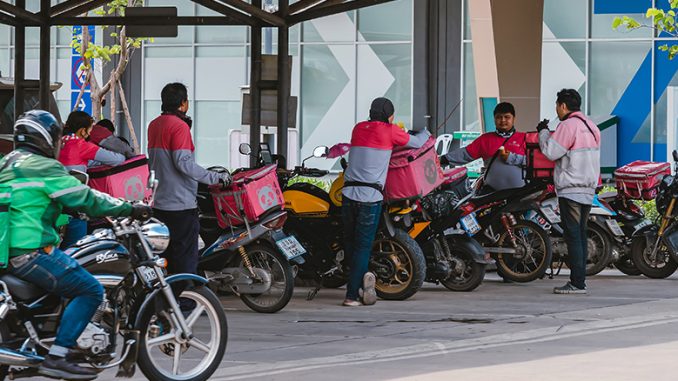
This article briefly discusses the issue affecting Thai ride-hailing and food delivery platform workers, known as ‘riders.’ The data presented here was collected through participatory observation and a survey with 435 riders who live and work in Bangkok and three other provinces, namely Khon Kaen, Ang Thong, and Pattani. In observing protests and interviews with several leaders of the riders’ organizations, I found that disunity among riders is related to their understanding of the connection between employment relationships and social protection.
Riders’ Problems
Through analysis of 19 demonstrations organized by different riders’ groups between January 2020 and August 2021, I found that riders’ demands are primarily focused on wages and incentives (89.5%), algorithm malfunctions on the platforms (41.2%), changes in working conditions (41.2%), and requests for accidental insurance (11.8%). These four demands are related and were reaffirmed by survey data. Riders’ wages and incentives have been significantly reduced; for instance, Grab paid their riders in Bangkok around 60 THB in 2018 but 38 THB at present. Regarding wages and incentives, the platform companies respond only by saying the market is very competitive. The companies claim that to survive in this business, they have to reduce wages and incentives. Reduced wages mean riders must work longer hours to maintain a consistent income level. According to my survey, many riders substantiated this claim by sharing that they are indeed working longer hours. 36.6% reported working 41-60 hours a week, and 44.8% reported working more than 60 hours a week. The intensifying competition among riders, as the number of riders has significantly increased, is also a factor that has caused riders to get fewer jobs and to standby for longer hours to maintain their income.
Working such long hours increases the risk of accidents. According to the survey, 33.5% of informants reported being involved in accidents, including falling from their vehicle, being hit by another vehicle, or colliding. Changed algorithms that force riders to respond to multiple customers simultaneously may also lead to accidents. The matching algorithm attempts to match jobs according to the ratings riders have earned from previous customers. To avoid customers blaming riders for delayed food delivery and subsequently penalizing the riders with low ratings, riders deliver food more hastily to satisfy customers, leading to an increased risk of accidents.
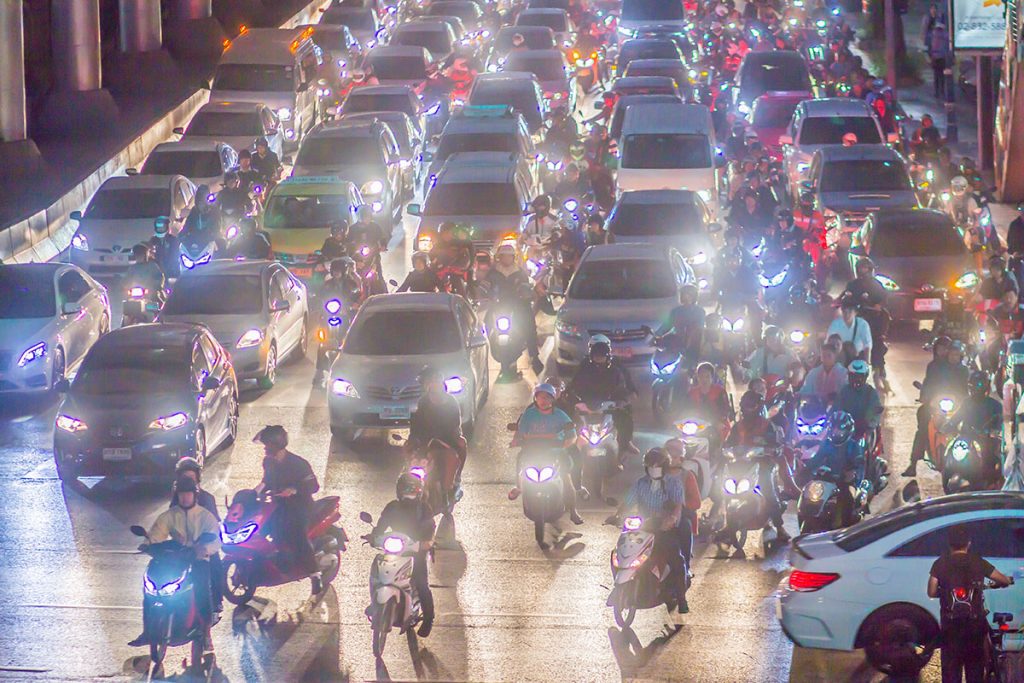
Riders also reported that they often encounter problems due to errors of the platforms’ application operations. According to the survey data, 51.1% of respondents have experienced application malfunctions, such as freezing, lagging, errors, and an inability to continue working. The second most prevalent problem is related to maps and GPS systems, where incorrect pick-up and drop-off locations are indicated, resulting in wasted time, increased fuel costs, and sometimes leading to conflicts with customers.
The riders’ demands and the platforms’ silence reflect that riders need more negotiation power. A higher degree of collective action among riders could bring about positive changes, however, among the 19 demonstrations I observed, the majority did not bring together riders from different platforms. In the next part, we will discuss the riders’ movements and the relationships among them.
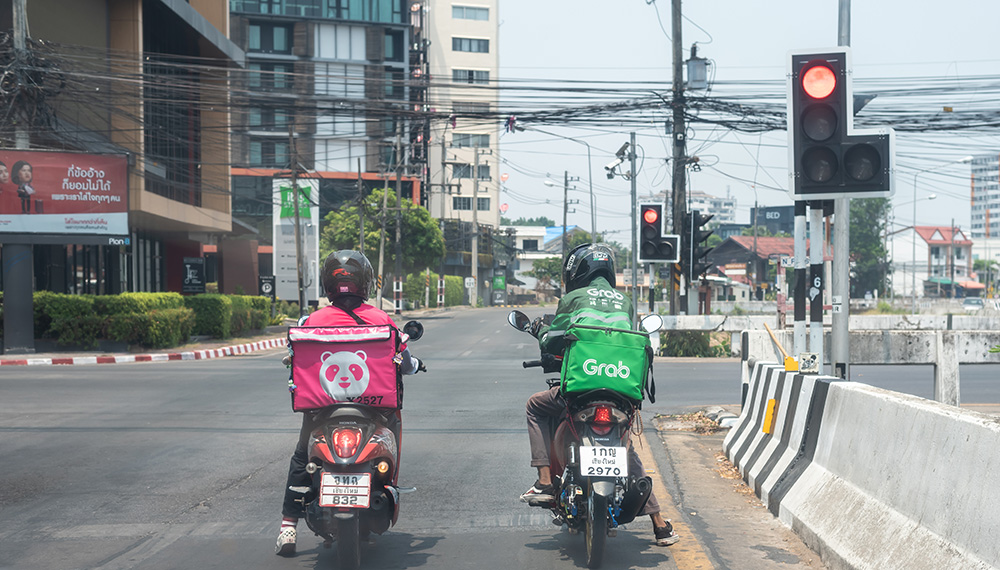
Inside the Thai Riders’ Movement
Riders usually gather on social media platforms. I first encountered the use of social media platforms among riders during my initial research on the impact of the platform economy on service sectors (Wantanasombut & Teerakowitkajorn, 2018). Back then, I observed that riders gathered virtually to share information about their daily work life and unfair working conditions. They sometimes arranged group meetings to socialize or organized activities like outing trips and charity activities. These groups started to gain attention from other riders, further increasing the number of members and followers. Many riders were members of more than one group, with some groups growing from a few hundred to more than one hundred thousand members. We can divide these groups into two categories: pressure groups and complaint groups. The pressure groups are those that struggle for rights and better working conditions, pressuring platform companies through protests, strikes, and petitions. The complaint groups refer to those where most members have come together to express dissatisfaction and prefer a more conciliatory approach to discussions with the platform companies.
Within the pressure groups, which are the focus of this article, there are three main sub-groups, namely the Grab Fast-Moving We Help Each Other (GFM), the Freedom Rider Union (FRU), and the Thai Rider Association (TRA). Though these three groups each fight with platform companies, they are not really on the same page. For example, the FRU was originally the Lalamove Union, established in response to the platform’s reduction of wages.
The growth of the food delivery market has drawn the attention of big tech companies, including Line, a popular communication platform in Thailand. Line Thailand, a subsidiary company of the giant tech firm in Japan, started expanding its economy of scope, first allowing its digital messaging service users to call for a document messenger through its platform. This extension service was known as ‘Line Man.’ Later, Line Thailand entered the food delivery market by acquiring Wongnai, a famous restaurant reviewing platform that had collected a vast data set of more than 400,000 restaurants from all over Thailand (Chinsupakul, 2020). With the M&A deal between the two companies, Line Man Wongnai (LMWN) was founded. Initially, LMWN did not have its own fleet of riders. Instead, they partnered with Lalamove, a Hong Kong delivery platform that also operates in Thailand. Later, as competitors proliferated, the market became so competitive that LMWN had no choice but to cut costs by terminating its partnership with Lalamove and managing the delivery part by itself. LMWN called for the volunteering of former Lalamove riders who chose to work for them to switch from Lalamove to LMWN. During this transition period, the Lalamove Union played a lead role in negotiating wages and working conditions with advice from NGOs and Labour Organizations, including the Just Economy and Labour Institute (JELI) and the Solidarity Center (SC). As Lalamove riders had now split into two platforms, the Lalamove Union changed its name to the FRU in order to represent both groups of riders and, later, to represent riders of other platform companies as well. With support from local NGOs and Labor Organizations, FRU can ally itself with civil society organizations, social movements, authorities, and political parties. Among the pressure groups, FRU is the most progressive and often works to address structural problems. One of FRU’s main demands is for the Labor Protection Act to cover riders, FRU believes riders should be regarded as the platform’s employees. FRU is now actively organizing rider groups nationwide in the provincial areas.
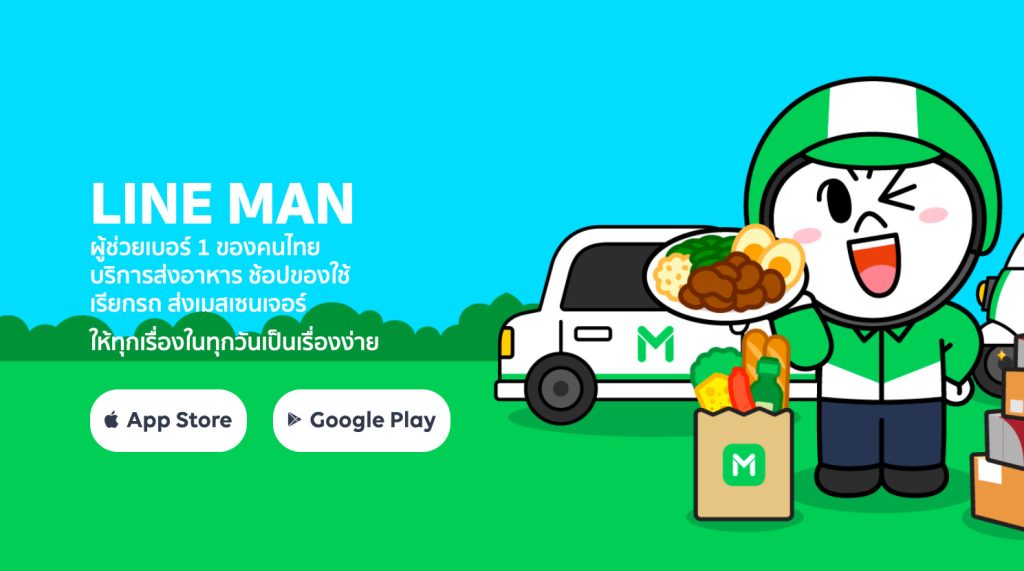
The Grab Fast-Moving We Help Each Other (GFM) was founded as a result of the conflict between traditional motorcycle taxi drivers, called Win in local Thai language, and riders serving passengers through ride-hailing applications. To be a Win, drivers have to follow the regulations of the Thai authorities that set specific standards, such as engine size, public transportation driving license, fees, etc. However, when Grab entered the market, the platform ignored all relevant Win laws and regulations. Anyone with a motorcycle was able to work with the platform. Thus, the platforms disrupted not only the laws but also the job security of the Win drivers. The response from the Win drivers was harsh as they saw platform riders as illegally taking their jobs. The Win drivers would often block riders from taking passengers in their area, take photos of the rider’s license plate and report the rider to the authorities, quarrel with riders, and, in many cases, such altercations culminated with assault. GFM was formed as a response to this situation. If a platform rider is stopped or threatened by a Win driver, the platform rider can call for help from other riders in the group and the members nearby will move fast in an effort to help. The GFM has also called for protests, mainly focused on the changing working conditions and, more recently, on the petition to legalize ride-hailing services for motorcycle taxis (Wantanasombut, 2023).
The third main pressure group is the Thai Rider Association (TRA). The leaders of this group used to work closely with the FRU. They later separated from the FRU as they disagreed on goals and conflicted over the support the FRU received from local NGOs and Labor Organizations. After several quarrels with Win drivers, the TRA leaders became close with The EV Motorcycle Taxi Association, who suggested the TRA to register as a legal association. Thus, the TRA became the first group of riders registered with the authorities while the FRU and the GFM gathered informally. Although the FRU refers to themselves a ‘union,’ Thai labor law has barred them from establishing an official labor union as the authorities do not consider riders to be ‘employees’ of the platform company. The close association of TRA with Win drivers has turned its relationship with the GFM sour, as the GFM considers Win drivers to be direct opponents of platform riders.
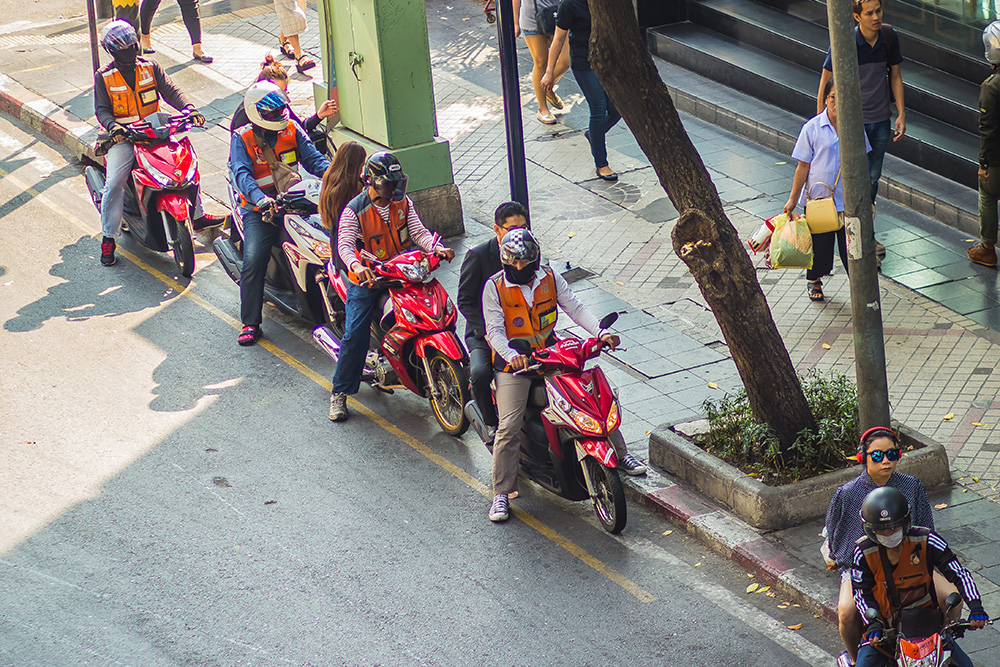
Flexibility and Precarity
Being a rider offers flexibility and independence for riders, but often comes with a cost. As mentioned in the previous section, most of the problems riders face, such as income instability, lack of benefits, safety concerns, freedom of association, and the right to collective bargaining, which, together, are known as precarity of work, are often discussed. In platform work, flexibility and precarity are often seen as trade-offs; in the Thai context, this is also a consequence of the classification of employment relationships and their relevant social protections.
According to Thai labor laws, self-employed and independent contractors are not covered by the Labor Protection Act (LPA), which protects laborer’s fundamental rights, including wages and benefits, working conditions, discrimination, etc. Nor are they covered by the Labor Relationship Act (LRA) that guarantees freedom of association, collective bargaining, lockouts and strikes, and other unfair treatment by employers. As the LPA and LRA do not cover platform riders, they are instead covered under the Civil and Commercial Code (CCC).
To identify the employment relationship of riders, one must look at the definitions according to the LPA and CCC as follows: 1) Definition of the completion of work; 2) Payment upon completion of work or services; 3) Control over the process of work; 4) Ownership of the means of production; 5) Responsibility for damage. As such, the employment relationship of riders is blurred. In some criteria, riders are explicitly platform employees, but in others, riders are considered independent contractors. There is also the case of the tools and resources used in production, which falls in between both sides of the employment relationship since the smartphone belongs to the rider, while the application is owned by the platform company.
| Completion of work | |||
| Payment of completion of services | |||
| Control of process of work | |||
| Tools and resources | |||
| Responsibility for damage | |||
As a result, platform riders are not covered by the LPA, nor the LRA. Thus, to reduce precarity, many suggest that riders should be considered employees of the platform company. However, according to the survey, though riders want better working conditions, 51.7% insist that they prefer to be independent contractors. This paradox led to disagreements amongst the pressure groups, particularly because FRU strongly believes riders are employees. In contrast, GFM and TRA believe differently, resulting in disunity among these pressure groups.
Conclusion
Flexibility and precarity should not be made a trade-off. Comprehensive improvements must be made to balance the gig economy’s flexibility and platform workers’ security needs. First, we must rethink classifying riders or platform workers to ensure more protection. Social protection of all types of worker classifications should be equally guaranteed. Equally important is a guaranteed base income and transparency of platform algorithms. Unity among riders is also essential; allowing riders to voice concerns and negotiate terms collectively through legal unions would better help their demands to be heard and accepted by platform companies. Through integration of these elements, I believe a framework can be constructed in which flexibility and security for platform riders coexist harmoniously.
Akkanut Wantanasombut
Institute of Asian Studies, Chulalongkorn University
References
Chinsupakul, Y. (2020, August 6). Facebook. Retrieved October 16, 2023, from https://www.facebook.com/yod.chinsupakul/posts/10223503012863396
Eukeik.ee. (16 September 2020). (Analysis) Why GET need rebranding to be Gojek? Retrieved August 1, 2021, from https://marketeeronline.co/archives/188145
Matemate. (2020, June 12). Robinhood is a small application that may change the entire Food Delivery business. Retrieved August 10, 2021, from https://brandinside.asia/robinhood-food-delivery/
MGR Online. (2020, October 1). ‘“Lineman Wongnai” soared into National Champion with 3.7 ten billion baht. Retrieved 17 October 17, 2022, from https://mgronline.com/business/detail/9650000095152
Prachachat. (28 July 2021). “Foodpanda” lessons from crisis and a second chance. Retrieved 30 July 2021 From https://www.prachachat.net/ict/news-724414
Techasriamornrat, S. (2021, January 26). Robinhood enhanced to other provinces after an 88-day plan in delivery competition. Retrieved August 10, 2021, from Workpoint TODAY: https://workpointtoday.com/robinhood-plan-64/
Transport Journal. (2021, February 1). Dhipaya Insurance Public Company cooperates with Gojek on an on-demand service via GoSend. Transport Journal
Wantanasombut, A. (2023, February 27). Another double standard to come: The legalisation of ride-hailing in Thailand. LSE Southeast Asia Blog. Retrieved October 16, 2023, from https://blogs.lse.ac.uk/seac/2023/02/23/another-double-standard-to-come-the-legalisation-of-ride-hailing-in-thailand/
Wantanasombut, A. & Pitukthanin, A. (2021, August). Riders – Heroes – Chains — the Working Conditions and Social Security of Food Delivery Workers on the Platform Economy during the COVID-19 Pandemic. Collaborating Center for Labour Research, Chulalongkorn University.
Wantanasombut, A. & Teerakowitkajorn, K. (2018). Platform Economy and its impact on service workers: case studies from Thailand. Bangkok: Friedrich-Ebert-Stiftung. https://library.fes.de/pdf- files/bueros/thailand/14771.pdf
